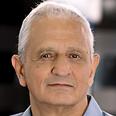Dr. Tzemach and her colleagues gave Yair Lapid and his Yesh Atid party 24 Knesset seats (out of a total of 120), with Prime Minister Netanyahu's Likud party getting just 22. That wasn't the only interesting finding. According to the poll, two-to-three of Lapid's new seats were coming from Likud voters. Assuming the parties in Israel can be divided into general right-left political wings, it seems now that the right wing is losing a number of votes in favor of the left-center wing. Hypothetically, Lapid is just six seats away (incidentally, the number of seats currently projected to be won by Finance Minister Moshe Kahlon's Kulanu party) from creating a serious electoral obstacle to any would-be right-wing government.
Yesh Atid claim that the polls conducted for it by American pollster Mark Mellman show similar findings. Mellman's polls were conducted before the train-Shabbat affair
that harmed Netanyahu's standing with many members of the public.
The first consequence of this new poll is the end of Transportation Minister Yisrael Katz's short tenure as enemy of the people. From now on, Netanyahu's fire will be aimed at Lapid. Battalions of internet commenters, bloggers, tweeters, etc. shall now switch their focus in unison. Katz's putsch—out; the Lapid threat—in. It's fine to relieve someone of their enemy status, but they must always be replaced by another.
Lapid has learned his political lesson. He knows that the poll has both positive and negative effects. On one hand, it presents Lapid as the alternative to Netanyahu, ahead of Zionist Union leader MK Isaac Herzog, former Likud ministers Gideon Sa'ar and Moshe Ya'alon, and former IDF Chiefs of Staff Benny Gantz and Gabi Ashkenazi. On the other hand, polls create expectations. If the next poll shows Lapid getting 19 Knesset seats as opposed to his current 24, headlines will indicate his sharp decline. There's a chance his rise was too high, too fast.
Lapid's also learned an important political skill: Keeping quiet. You have to give more interviews, a senior Yesh Atid member recently told him. Think of this, he answered: Who's the politician who gave the most interviews to the media in the past few monts? Did it do him any good? She could come up with just one name to answer Lapid—Herzog. Lapid carried on with his tight-fisted approach to interviews.
Right after the March 2015 elections, which gave Yesh Atid 11 Knesset seats—a drop of eight, from their previous 19 seats—Lapid told his people: We now have two options: Being an opposition, or being an alternative. I choose to be an alternative.
That wasn't a simple choice. It forced the party, and chiefly Lapid himself, to abandon the role set up for it by the voters. Too much oppositional activity would have painted Lapid as a leftist. That's what happened to Shimon Peres when he was the leader of the opposition to PM Menachem Begin in the late 70s. Lapid doesn't want to stand in Peres's old spot—he wants to stand in Netanyahu's current one.
Polls have taught us that about 21 percent of voters are looking for what could be called "pragmatic patriotism," an attitude that combines the idealizing of the state and its symbols along with a practical, open, approach to any topic on the agenda. These are the voters to whom Lapid was appealing. Not the true left, inflexible in its views and comprising about seven percent of the vote, not the ultra-Orthodox, not the settler right, and not the residents of the periphery. The destination was Rishon LeZion: As a place, a symbol, and a codeword.
In recent months, Lapid has gone relatively easy on the ultra-Orthodox. His main objective became patriotic PR trips abroad. When he stood in a Stockholm square and trained locals to say "We love Israel," he was appealing to voters in his homeland. There's not much that excites Israelis more than seeing Swedes obey an Israeli, one of our own, who's teaching them a lesson in loving this country. It shows strength and subtlety, evocative of the likes of judoka Ori Sasson, who defeated his Egyptian opponent, showed good sportsmanship in the face of rudeness, and ended up winning an Olympic medal.
In a certain sense, Lapid is like Netanyahu. In another, he's his mirror image. Like Netanyahu, Lapid shapes his message according to the demands of his audience. Both market themselves well; both do it with extraordinary diligence.
Netanyahu, however, tends to speak with a negative, combative tone, and pits sectors of the population against each other when it suits him. Lapid is his opposite on this: He tries to speak in a positive, appeasing, and embracing tone. Netanyahu has much to lose, which drags him into silly, controversial, mistakes—such as in the train affair. His ministers and partners are at his back, picking fights. Lapid has fewer assets to lose and his party members accept his rule. He can afford to be more daring, here and there. "Beware of wariness," he tells his people.
Beyond all of this, his party is the only one that's currently active in the field. Yesh Atid has 11,000 registered activists in 143 branches across Israel. They're quietly reinforced by the party, via quiet, unpublicized conventions. Lapid recently gave a speech in Karmiel. Before that, he went to a small convention in Ma'ale Adumim.
The 24 seats Dr. Tzemach projected for Lapid indicate, first and foremost, the large vacuum in the Israeli political center. Among existing players, Lapid is probably the most attractive. However, by the time of the next elections, other players will join in, and perhaps new parties as well. Netanyahu will keep fighting for what's his: He's good at that. The best, in fact.





















